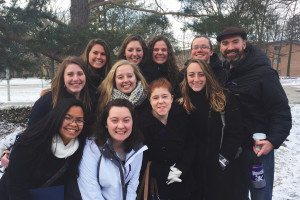This past weekend, a group of Houghton students joined ten other universities at the annual Calvin College Faith and International Development conference. Agape, a word of Greek origin and the focus of the conference, signifies the highest form of love. Simply defined, agape describes the love of God and from God, whose nature is love itself (1 John 4:8).
Faustine Wabwire of Bread for the World, one of the first plenary speakers, challenged attendees: “The world is wounded, and so many of God’s children are hurting in profound ways. They experience fear and hunger as they attempt to swim across the cold ocean waters to escape conflict in Syria. Something is wrong. Have we moved away from agape? Is there room for it in our lives today?”
In supplement, Peter Greer, President and CEO of Hope International, shared that agape is not part of human nature, as sacrificially loving people is inherently dangerous.. However, both Scripture and Jesus’ life challenge Christians to follow their Savior in fearless agape: a dangerous, costly, selfless love. Greer, with transparency, acknowledged the human inner conflict, “agape is how I want to live, if even though sometimes all I want to do is run away with a gallon of mint chocolate chip ice cream and a Netflix subscription.”
Sara Steffenhagen ‘16 further explained that weaving agape strengthens the sometimes tattered fabric of development work, “selflessness is necessary, because development is about long-term relationships and the understanding that you may never see any of your hard work, or deep love, come to fruition.”
 Students discussed how to integrate agape love into attitudes toward mass incarceration, immigration, hunger and malnutrition, restorative justice, and agricultural practices with a diverse set of organizations. Additionally, students viewed Reparando, which documents Tita Evertsz and Erwin “Shorty” Luna’s efforts to restore and revitalize the Guatemalan city of La Limonada, and a performance of Seven, a documentary play based on the lives of women’s rights activists spread across the globe.
Students discussed how to integrate agape love into attitudes toward mass incarceration, immigration, hunger and malnutrition, restorative justice, and agricultural practices with a diverse set of organizations. Additionally, students viewed Reparando, which documents Tita Evertsz and Erwin “Shorty” Luna’s efforts to restore and revitalize the Guatemalan city of La Limonada, and a performance of Seven, a documentary play based on the lives of women’s rights activists spread across the globe.
“Seven was powerful because it modified a depressing posture of, ‘this is how women are treated, let’s go do something about it’ to, ‘this is how women are treated and this is what they are doing about it,’ which was sobering,” said Bethany Rudolph ‘17.
Nearly every Houghton attendee participated in an exercise with a Bread for the World staff member who affirmed students’ roles in representative democracy by presenting a script for calling respective state senators and urging a “yes” vote on the Global Food Security Act.
Senator and representative offices track calls received in support of particular legislation. Senators will likely side with constituents if ambivalent towards a decision.
“Calling my senators was much easier than I expected and also super impactful for taking just under one minute. I’m definitely going to do it again,” said Sarah McCloy ‘16.
Jason Fileta, Director of Micah Challenge, explained a similar experience during his lecture at the Faith and Justice Symposium last fall. While a student at Calvin College, Fileta became exhausted with inaction despite continuous learning about injustice.
A frustrated Fileta and a handful of Calvin students contacted senate and representative offices weekly. Persistency proved successful; by the end of the semester, the congressman requested to meet with students for further discussion regarding the issue advocated for.
Houghton’s Sustainability Coordinator, Brian Webb, bridged both Fileta’s and Bread for the World’s templates for advocacy by proposing implementation of the ‘Do Something Table’ at Houghton. The table would allow students to write letters to or call senators regarding social justice issues. Webb asserts, “it’s just a practical way students can live out faith that can influence the country in bigger ways than they can imagine.” During conference debriefs, students showed enthusiasm for and supported Webb’s proposal.
The conference, its speakers, and activities, reminded students that whether domestically or abroad, Christ followers are called to relentless advocacy, pursuit of justice, and agape love as modeled by Jesus. Its challenges hold weight, for if advocacy and justice pursuits lacks agape, the Christian story may be seen as inauthentic, and a form of politically expedient, engineered propaganda.
